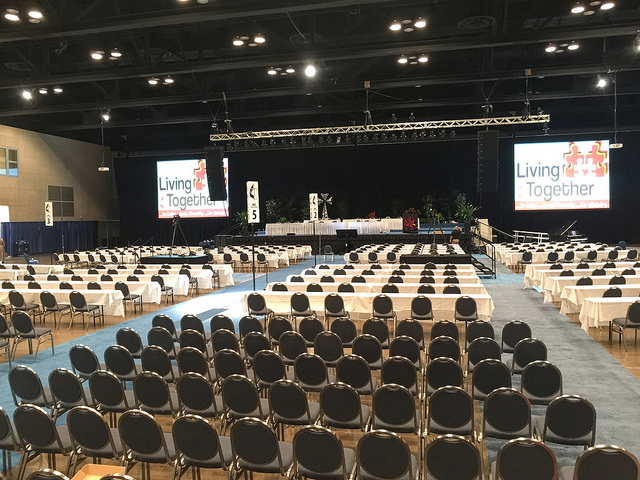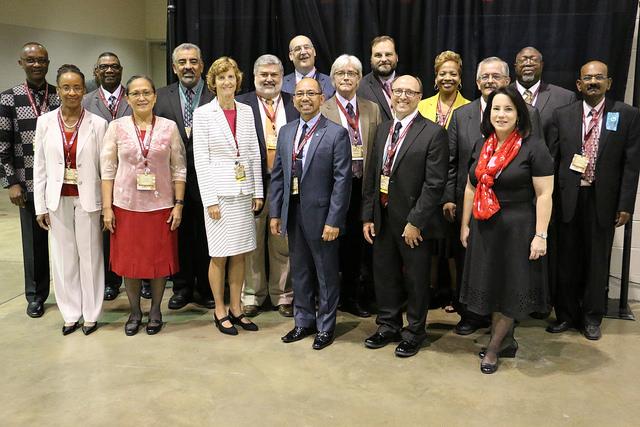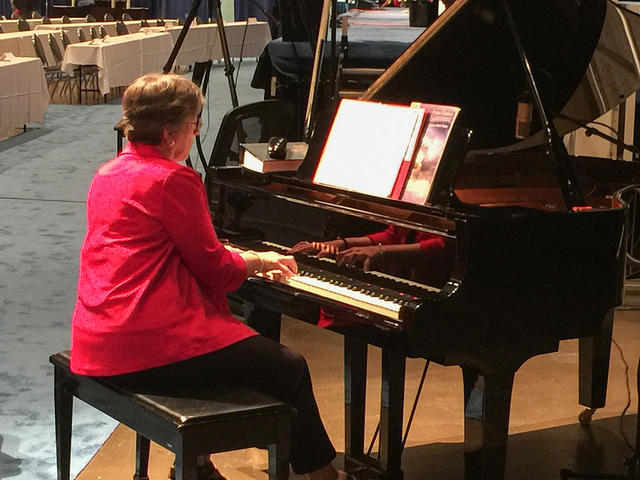
NCJ to gather in Peoria to elect four bishops
By Paul Black, director of communication, Illinois Great Rivers Conference UMC
 PEORIA, Ill. – Delegates from the 11 annual conferences of the North Central Jurisdiction are gathered in Peoria, Ill., July 13-16, they become part of a 76-year tradition.
PEORIA, Ill. – Delegates from the 11 annual conferences of the North Central Jurisdiction are gathered in Peoria, Ill., July 13-16, they become part of a 76-year tradition.
Photo: Hall C home of the plenary sessions for the 2016 North Central Jurisdictinal. Photo of NCJ communicators.
Jurisdictions were a creation of the 1939 merger of the Methodist Episcopal Church North, the Methodist Episcopal Church South and the Methodist Protestant Church denominations. Prior to 1939, bishops were elected at General Conference and it was the fear of churches in the southern United States that their region would not be fairly represented in the Council of Bishops. The Methodist Protestant denomination also voiced concerns, having left the Methodist Church in 1828 over episcopal authority, adopting a more congregational model of governance.
In the United States, The United Methodist Church is divided into five areas known as jurisdictions -- Northeastern, Southeastern, North Central, South Central and Western. In some jurisdictions, program and leadership training events to support the annual conferences are present. Every four years the jurisdictional conferences meet simultaneously to elect new bishops and select members of general boards and agencies.
Annual conferences located outside the United States are organized into central conferences, much like jurisdictions. There are seven central conferences: Africa, Central and Southern Europe, Congo, Germany, Northern Europe, Philippines, and West Africa.
Episcopal elections

Photo: The seventeen episcopal candidates for the North Central Jurisdiction. Photo by Rick Wolcott, East Ohio Director of Communications.
The North Central Jurisdicti on will elect four new bishops to fill the vacancies created by the retirements of Bishops Jonathan D. Keaton, John Hopkins, Michael Coyner and Deborah Lieder Kiesey. In all, the five jurisdictions will elect 15 new bishops to their respective College of Bishops and will join the Central Conference bishops in the denomination’s Council of Bishops.
on will elect four new bishops to fill the vacancies created by the retirements of Bishops Jonathan D. Keaton, John Hopkins, Michael Coyner and Deborah Lieder Kiesey. In all, the five jurisdictions will elect 15 new bishops to their respective College of Bishops and will join the Central Conference bishops in the denomination’s Council of Bishops.
Photo: Bishop Deborah Lieder Kiesey practices a muscial selection at NCJ. Kiesey, who served the Dakotas Conference form 2004-2012, will retire August 31, 2016.
While there are exceptions, persons elected to the episcopacy are generally those endorsed by a delegation or nominated by an annual conference. Delegates have been given detailed information about each candidate nominated by a conference two weeks prior to the first day of jurisdictional conference (¶405.1 of the Discipline).
However, delegates are not limited to official nominees. They can vote for someone their delegation or a caucus has endorsed. Numbers have been assigned to each elected UM clergy delegate to the NCJ Conference, but a person can offer any ordained UM minister and a number will be assigned to the nominee prior to the next ballot. Generally, information is provided at the site about persons who receive 10 votes or more in balloting.
During the jurisdictional conference, nominee forums will be held in the Peoria Civic Center where delegates may meet and hear from an episcopal candidate. In addition, there are times set aside for delegation meetings, where the conference’s elected delegates can confer with each other or interview specific candidates. Candidate forum and delegation rooms are located on the second floor and the fourth floor of the Peoria Civic Center.
Strange occurrences
Because it takes 60 percent for an election, a conference can sometimes become deadlocked when various delegations refuse to give up their candidate.
In 1980, it took a record 47 ballots to elect Calvin d. McConnell at the Western Jurisdictional Conference. Bishop McConnell had gone to the conference expecting to support the Rocky Mountain Conference nominee Jameson Jones. McConnell was offered up as a compromise candidate around the 18th ballot but was only elected after Richard Cain withdrew prior to the 46th ballot. A consecration service had to be postponed three times from 2 to 9 p.m. to finish the elections.
The NCJ has also had marathon elections. In 1984, Frank Nestler, in his second run for the episcopacy was locked in a battle with Judith Craig of East Ohio. Following the election of Bishop Rueben Job on the 30th ballot, the two candidates continued with Nestler getting as close as 18 votes on the 36th ballot before Craig was elected on the 41st ballot. Four years later, Bishop William B. Lewis of Southern Illinois was elected on the 38th ballot for the third and final College vacancy that year outlasting a challenge from Charles Wesley Jordan of Northern Illinois. Jordan was elected in 1992.
In 2004, the Rev. Dr. Tim Bias of the Illinois Great Rivers Conference and Sally Dyck of East Ohio were the last two standing following the 21st ballot. Although Bias narrowed the gap to three on the 22nd ballot and five on the 25th ballot, he finally withdrew before the 36th ballot at 15 minutes before midnight.
One NCJ church – North Broadway UMC in Columbus, Ohio – has the distinction of having had three pastors elected to the episcopacy while serving the church – Bishops Frances Ensley (1952), Lance Webb (1964) and C. Joseph Sprague (1996).
Twice persons have been elected outside their jurisdictions. In 1948, Bishop Gerald Kennedy, a member of the South Central Jurisdiction, was elected by the Western Jurisdiction. In 1984, Bishop Leotine T. C. Kelly left the Southeastern Jurisdiction meeting and traveled to the Western Jurisdiction to be consecrated bishop in 1984.
In 1988, Bishop Susan Morrison became the first woman bishop in the Northeastern Jurisdiction, having not been nominated, endorsed, or even a delegate to jurisdictional conference. Her name surfaced on the sixth ballot and she was elected bishop on the 18th ballot.
Final assignments
A Jurisdictional Committee on Episcopacy confers with the College of Bishops and recommends the assignment of bishops to their respective episcopal areas once the elections are complete. Jurisdictional Conference delegates must then approve these recommendations.
Generally assignments are limited to two quadrennial but can be extended to a third quadrennium upon a two-thirds vote of the committee and a majority vote of the jurisdiction to concur (¶406.1 of the Discipline).